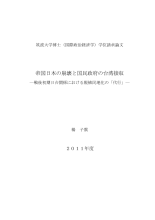1 0 0 0 IR 帝国日本の崩壊と国民政府の台湾接収 : 戦後初期日台関係における脱植民地化の「代行」
1 0 0 0 OA 戦後初期台湾における脱植民地化の代行
- 著者
- 楊 子震
- 出版者
- JAPAN ASSOCIATION OF INTERNATIONAL RELATIONS
- 雑誌
- 国際政治 (ISSN:04542215)
- 巻号頁・発行日
- vol.2010, no.162, pp.162_40-55, 2010-12-10 (Released:2012-10-20)
- 参考文献数
- 104
This paper focuses on Ryukyuans and Koreans living in Taiwan after the end of the Second World War, and by drawing a comparison of disparity in treatment between these two ethnic groups, examines the Chinese Nationalist government's seizure of Taiwan.The theme of this paper is “vicarious decolonization.” As a consequence, neither the ruling power (suzerain: Japan), nor the ruled (colony: Taiwan) were involved in the actual process of decolonization. For this reason the decolonization of Taiwan can be deemed to have been carried out vicariously.In this paper, I begin by discussing the Chinese Nationalist government's post-war relations with the Ryukyu Islands and the Korean Peninsula. Then, against the background of the collapse of the Japanese colonial empire and the Chinese Nationalist government's seizure of power, I compare the repatriation and conscription of the Ryukyuans and Koreans living in Taiwan by the Chinese Nationalist government by focusing the discussion on the drawing of boundaries among ethnic groups in Taiwan. Finally, I discuss the role played by the Chinese Nationalist government in Taiwan's post-war decolonization.Although the repatriation of the Ryukyuans and Koreans occurred slightly apart, there was little actual difference in the processes of repatriation. Soldiers and army personnel were repatriated at an early stage, followed by the repatriation of ordinary residents. The Chinese Nationalist government actively pursued the conscription of experts and engineers deemed useful for governing Taiwan.However, the conscripted experts and engineers were all outsiders, and the concept of conscription was nothing more than a temporary measure by the Chinese Nationalist government to secure its rule of Taiwan. The system of conscription conducted by the Chinese Nationalist government was a miniature copy of the pre-existing structure formerly adopted by Japan. Although there were some Ryukyuans amongst the experts and engineers working in the administration and research organizations, most positions were occupied by those born on the Japanese mainland. The fact that no Koreans can be found on the list of conscripts implies that Koreans were not included as part of the administrative side within the governing structure of the former colony of Taiwan.The Chinese Nationalist government's policy of repatriation and conscription of “Japanese people” reestablished borders among ethnic groups in Taiwan, and resulted in the vicarious decolonization and withdrawal of Taiwan from the Japanese colonial empire, while at the same time, through a continuation of existing occupation policies, was oriented toward maintaining the status quo.
1 0 0 0 OA 帝国日本の崩壊と国民政府の台湾接収 : 戦後初期日台関係における脱植民地化の「代行」
- 著者
- 楊 子震
- 巻号頁・発行日
- 2012
筑波大学博士 (国際政治経済学) 学位論文・平成24年3月23日授与 (甲第5980号)
